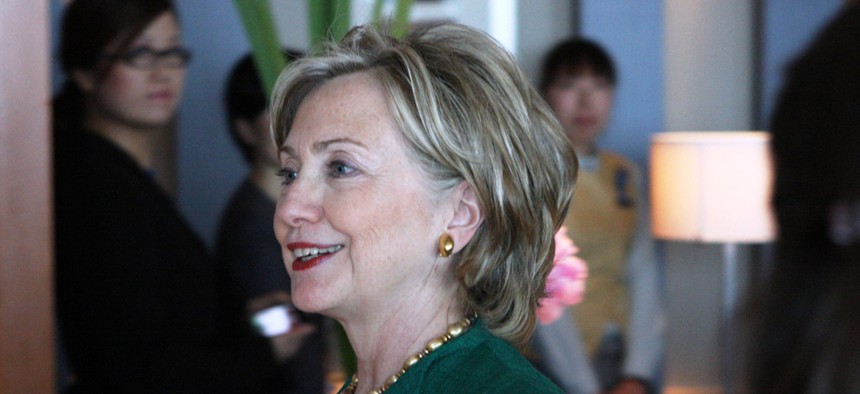
State Department file photo
Judge Wants 'Rolling' Release of Clinton Emails
The State Department wants to put most of the Democratic front-runner's emails out in January, but a federal judge rejected that plan.
A federal judge is ordering the State Department to release thousands of Hillary Clinton's emails from her private server on a "rolling" basis, rejecting State's bid for a single large release in early 2016.
Judge Rudolph Contreras on Tuesday gave State until May 26 to craft a rolling schedule for release of emails from the 55,000 pages that Clinton turned over to State last year.
The judge's order Tuesday morning, part of a lawsuit seeking the records brought by Vice News, demands a "new production schedule for the Secretary Clinton emails that accounts for rolling production and updates from counsel every 60 days."
The move comes a day after State proposed a plan that would not make the "releasable" portions of the messages available until January 16, 2016, owing to the detailed and labor-intensive review of the printed material.
If accepted, State's proposal would have enabled a major release just ahead of nominating caucuses and primaries, which begin with the Iowa caucuses in early February and contests in New Hampshire, South Carolina, and Nevada later that month.
But the judge's new order isn't necessarily good news for Clinton, either. Although it remains unclear when State will begin releasing the documents, the rolling time line raises the prospect of a drip-drip-drip of emails that will repeatedly reintroduce a negative storyline as Clinton is campaigning.
On Tuesday Clinton told reporters in Iowa that she wants the State Department to release the messages as fast as possible.
"I want the American people to learn as much as we can about the work that I did with our diplomats and our development experts, because I think it will show how hard we worked and what we did for our country during the time that I was secretary of State, where I worked extremely hard on behalf of our values and our interests and our security, and the emails are part of that," she said after a campaign event in Cedar Falls.
"I want them out as soon as they can get out," Clinton said. "As much as they can expedite that process, that is what I am asking them to do, please move as quickly as they can possibly can."
Contreras is also requiring State to provide a separate proposed deadline for State to produce emails related specifically to the Benghazi attack.
State plans to release a much smaller set of 300 emails related to Libya and the 2012 Benghazi attacks soon, perhaps within days, according to several news reports. Those messages were already provided to the House panel that Republicans created to probe the Benghazi attack.
State Department spokesman Jeff Rathke told reporters Tuesday that "we take our legal obligations seriously" and will comply with the order.
State's proposal and the judge's new order are the latest sign of blowback from Clinton's controversial email practices.
In the court filing Monday, the custodian of the records said State is moving as fast as possible to make the messages available online, but said there are hurdles inherent to the vetting process.
"The collection is ... voluminous and, due to the breadth of topics, the nature of the communications, and the interests of several agencies, presents several challenges," said John Hackett, State's acting director of the Office of Information Programs and Services, in the U.S. District Court for the District of Columbia filing.
Hackett's proposal for a single big release next January, while rejected by the judge, nonetheless provided a window into the vetting process and its complexity.
It noted at one point that "the review of these materials will likely require consultation with a broad range of subject-matter experts within the department and other agencies, as well as potentially with foreign governments."
"Like the Department of State itself, each of the U.S. government agencies that need to review these documents deals with sensitive, emergent issues, which may require them to reallocate priorities and resources in response to changing events around the globe. Thus, the amount of time that other agencies may need to review these documents cannot be predicted with precision," the filing states.
The scanning process took five weeks alone and was completed only this month.
Hackett's filing describes in detail how State is handling the messages. The 55,000-page email collection has been broken into 300 segments that contain about 100 messages each.
It said State's Freedom of Information Act office plans to review about 1,000 emails each week (and redact material as needed), and after each batch is reviewed it is sent to "subject-matter experts" (SMEs) elsewhere within State for a weeklong review, and then "incorporate any appropriate review recommendations from the SMEs."
From there, the sequential batch-by-batch vetting involves reviews by other federal agencies—which could include the Defense Department, the CIA, and others—and their recommendations will occur as needed, while the batches are then reviewed by State's Office of the Legal Adviser.
A final review of each batch follows so that "any divergent recommendations among reviewing entities will be resolved through discussions," the filing stated.







